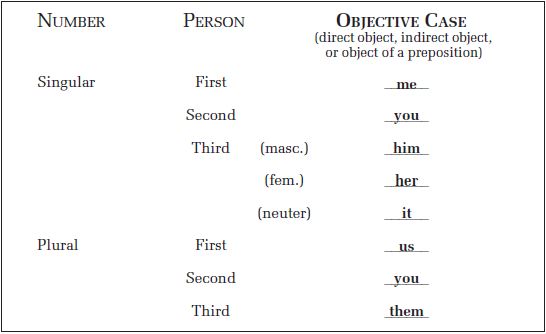Objective Case
Pronouns used as subjects and predicate nominatives are in the nominative case, and pronouns that show possession are in the possessive case.
Pronouns are in the objective case when they are used as direct objects, indirect objects, or objects of a preposition.
- Mosquitoes are biting me. (direct object)
- Hand me the repellent. (indirect object)
- Sue can sit with me. (object of a preposition)
- Please take them. (direct object)
- Did you give them directions? (indirect object)
- I'll sit by them. (object of a preposition)
- I think Ms. Hoo likes us. (direct object)
- Please cook us dinner. (indirect object)
- These maps belong to us. (object of a preposition)
- Kurt was watching me. (direct object)
- Pass me the potatoes. (indirect object)
- You can ride with me. (object of a preposition)
- Johannes Kepler confounded them. (direct object)
- Kepler gave us three laws on planetary motion. (indirect object)
- The scientist shared his research with me. (object of a preposition)
- Robert Morris joined them. (direct object)
- Lee offered me two orphaned mice. (indirect object)
- Zena rode with us. (object of a preposition)
Example 1
Complete this chart by replacing each blank with the correct objective case pronoun.

Solution
We complete the chart as follows:

Direct Objects
The following sentences use personal pronouns as direct objects. We remember to use objective case pronouns.
- My dog likes her. (not she)
- Ms. Hoo taught Ian and me. (not I)
- Alex warned them. (not they)
- Jim's sister hugged Jim and me. (not I)
- The geese chased them. (not they)
- One caught me. (not I)
- I calmed him. (not he)
- The king banished him. (not he)
- Manuel surprised me. (not I)
Example 2
Write a sentence using a personal pronoun as a direct object.
Solution
Here are some correct examples:
- Samuel remembers him.
- Jill will call Alberto and her.
- The cat might eat it.
- Boomer buried them.
- Robert Morris intrigues her.
- Mr. Morris does not interest Bert or me.
- That senator opposes it.
Indirect Objects
These sentences use personal pronouns as indirect objects. Note that the pronouns are in the objective case.
- Mrs. Tran gave her a pen. (not she)
- Karina loaned Nien and me a dollar. (not I)
- Kelvin baked us biscuits. (not we)
- Jack Sprat ordered her some fat. (not she)
- The Knave of Hearts denied her and me the tarts. (not she and I)
Example 3
Write a sentence using an objective case personal pronoun as an indirect object.
Solution
Your answers will be unique. Here are some correct examples:
- Nora will tell him the truth.
- Anthony gave them a hint.
- Jay read Julie and her the article.
- The Red Cross offered us hot food.
- The cook baked them a blackbird pie.
- Some children sold them bottled water.
Objects of a Preposition
The sentences below use personal pronouns as objects of a preposition. The pronouns are in the objective case.
- The librarian read a story to them. (not they)
- Dr. Kim waited for me. (not I)
- The ducks flew over us. (not we)
- Al's plane swooped over them. (not they)
- Velma sets dainty dishes before him and me. (not her and I)
- The ground was trembling under us. (not we)
- Dr. Kutz spoke on behalf of them and me. (not they and I)
- Patriots shouted around us. (not we)
Example 4
Write a sentence using a personal pronoun as an object of a preposition.
Solution
Your answers will be unique. Here are some correct examples:
- A duck lands near them.
- Retha collects ideas from us.
- My aunt stood behind me.
- The queen will parade near them.
- The king is gathering ideas from them and us.
- Some rhymes seem ridiculous to me.
- Robert Morris's firm ruled over them.
- The firm earns money from you and us.
- My team won in spite of me.
Compound Objects
Objective case pronouns can be compound. We politely mention ourselves last.
- Mom hugged her and me. (compound direct object)
- Joe gave him and me a gift. (compound indirect object)
- Bees buzzed around them and us. (compound object of a preposition)
- Bao sent her and me a postcard.
- Xana presented Anna Maria and us an invitation.
- Trina laughed with him and me.
- The camera flash temporarily blinded her and us.
- Binh loaned him and me some golf clubs.
Example 5
Choose the sentence that is both correct and polite.
- Gwyn sliced an apple for me and him.
- Gwyn sliced an apple for he and I.
- Gwyn sliced an apple for him and me.
- Gwyn sliced an apple for him and I.
Solution
The objective case pronouns are him and me. Also, we politely mention ourselves last.
Gwyn sliced an apple for him and me.